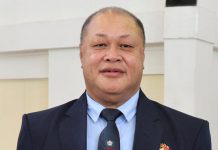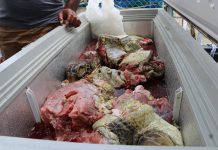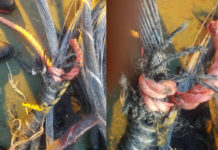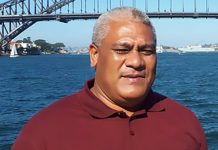One of Tonga’s most popular acoustic and electric band guitarists and composers, Siale ‘Iongi believes he has recorded more songs ever than any Tongan composers and players.
Siale , 69, said his composition’s music and lyrics were simple and intentionally written so they could easily move his listeners.
He said most of his songs were composed to tell how he loved members of his family and kāinga, He said sometime people wrote their own lyrics and ask him to compose the music before singing and recording them.
He said he composed his lyrics to the best of his ability and used music that put those at the top of the playlist on national radio for weeks. This included the song widely known today as 747 when it was first released about 30 years ago.
Siale first played his ukulele and recorded his first song when he was 15.
He did not study music or literature and he described how he began his musical career as like using his hand to feel around to see whether he could touch something (‘fāfā holo pe’.)
He began by playing and recording songs composed by various punakes (composers) at the national radio broadcaster, the ZCO which was later renamed as A3Z. These included the Tuingapapai, a song composed by well known musicians the Kefu family from Lapaha.
He later composed his own songs after he organised himself with some friends into his first acoustic group band called Tupetaiki ‘O e Funga Vaitaki in ‘Eua.
His first compositions included Si’i Losehina e, a song he composed for his sister Lesieli Tauki’uvea. He also composed a song for one of Lesieli’s daughters, Cindy Tauki’uvea. This popular song was known as Ta’ahine ‘Esi Ko Ma’afu.
He also composed another popular love song known as Funga Pousini, for his sister Seneti and her husband Fauniteni.
Siale said he vividly remembered the song because it was recorded for ‘Epoki ‘O E 85 (Epoch of 85), an album he regarded as a milestone in his musical career. He said Seneti and Fauniteni were working in Samoa when they sponsored them to come to Samoa and recorded the album there.
“It’s a sweet memory I have because they spent a lot to fly us from Tonga to Samoa and they paid for the recording in a studio belonging to a foreigner,” Siale told Kaniva news in an exclusive interview.
Siale said the album was a big breakthrough.
He said his young brother Molonai ‘Iongi had just returned from Hawai’i at the time after studying music there.
Molonai helped in the production of the album and some brass instruments were added to the guitars, drums and keyboard they used.
“If you play that album you can realise there was an improvement in the instrumentation because of my brother’s help,” Siale said smilingly.
Criticisms
Siale said he could not deny his critics when they said he failed to observe the cultural standard of composing metaphoric lyrics in some of his songs.
He said his composition style evolved. He used rearrangements of English music for his lyrics a lot and sometime used foreign music for the verses and composed an original tune for the chorus.
These days Tongan contemporary punakes could mix Tongan and foreign languages in their lyrics, he said.
The beginning
Siale, who grew up in Tokomololo in Tongatapu, said he went with his father to the island of ‘Eua in an attempt to bring timbers to build a church for their Mormon community.
His father then went to the island of Niua and returned with the ukulele made out of coconut shells and nylon. It was a souvenir for Siale’s oldest brother, but his brother did not like it, so he took it and began playing it.
He began by trying to tune it and playing it while he was at Liahona High School. He did not complete his high school level but continued on with his musical career, playing the ukulele before adding acoustic guitar and banjo.
He later shifted from acoustic instruments and established the Tongan Young Four and the ‘Iongi Brothers, which were electric band groups. They recorded a number of albums.
Recently he recorded about 15 albums of Tongan songs composed by various punakes with banjo as the leading instrument. These were songs composed for Tongan tau’olunga (dancing) and they were popular in the Tongan community in USA, Australia and New Zealand at Tongan functions and events.
The main points
- One of Tonga’s most popular acoustic and electric band guitarists and composers, Siale ‘Iongi believes he has recorded more songs ever than any Tongan composers and players.
- ‘Iongi , 69, said his composition’s music and lyrics were simple and intentionally written so they could easily move his listeners.







